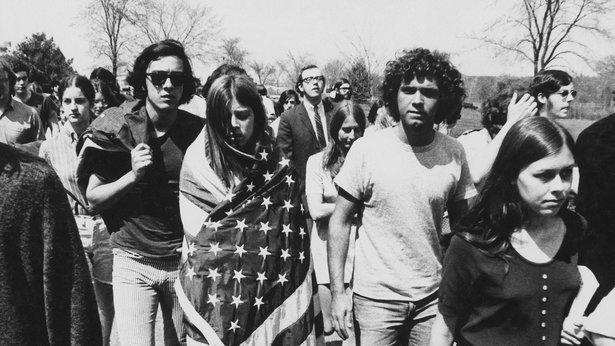music as social action :: Blog
|
As we approach the 1960s in America and zero in on how pop music connected with the issues of the era — as well as why the imagery of the ’60s protest singer has wielded certain power over later generations of musical protest — there are countless sources of literature and documentary film attempting to summarize and contextualize the social scene. Notably, last fall saw the premiere of famed documentary filmmaker Ken Burns' latest multi-part installment: "The Vietnam War."
The 10-episode series is available for viewing to PBS subscribers. For our immediate situation, it may be of interest to examine what music not only was chronicled by the documentary but was used on the film's soundtrack itself. To that end, PBS has compiled Spotify playlists of the music featured in each episode. In addition, music journalist David Fricke has written liner notes for the series' soundtrack, which can be read here. In this text — which covers and comments on an impressively wide variety of music, some of which we've discussed thus far — Fricke pushes some well-traveled discourses about how rock music was inextricable from the experience and understanding of the United States' involvement in that war, even going so far as to claim that "Vietnam was the first rock & roll war." Note, too, the way Fricke discusses the double-natured communication of some songs, specifically the way a cover by another artist (from another social group) changes and/or adds layers of meaning to the original — as we've begun to examine. Participation! In the interview with Theodor Adorno that we watched, he says that a protest song about the Vietnam war is unbearable — not based on a musical criticism but because, in his view, something as serious as a war should not be trivialized as a pop-culture commodity. How might he react to someone referring to the conflict as a "rock & roll war"? What work is being done — and on behalf of whom — when a war is framed in this way?
2 Comments
Jae Hyung Lee
2/5/2018 03:49:45 pm
Adorno will oppose to the idea of someone referring to the conflict as “rock & roll war,” because he believes that the war is a serious matter that should not be dealt in the form of a low brow popular music. However, when a war is framed in this specific situated practice, music could spread the message related to war to mass audience. Also, music helped end the war in a sense by arousing people to take action about their beliefs.
Reply
Zhenyi Shi
2/21/2018 11:00:31 pm
He'll oppose this idea, and may use it as an evidence to strengthen his claim that protest song about Vietnam war is making the war less serious, since in some ways the name "rock & roll war" may shift people's attention to the pop culture, instead of human beings that have been brutally killed during the war.
Reply
Leave a Reply. |
COMM 190
|

 RSS Feed
RSS Feed